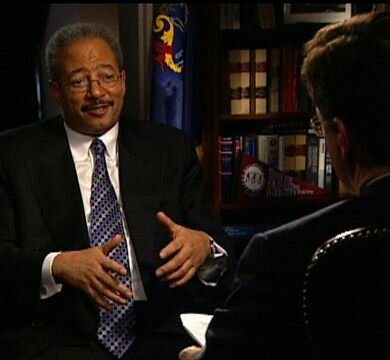Rep. Fattah’s mandate for health care reform was the 2008 Election, not Massachusetts
Featured — By Kathleen Wells on January 26, 2010 at 10:48Congressman Chaka Fattah (D-PA) is serving his eighth term in the U.S. House of Representatives and is a member of the influential and powerful Appropriations Committee.
The day following the Massachusetts Special Election, he spoke with me about the ramifications the election last Tuesday will have for Democrats and the necessity for Democrats to push forward with the mandate he believes President Obama received from the electorate a year ago.
Kathleen Wells: What does the Scott Brown victory in the Massachusetts Senate race say to Democrats in general?
Congressman Chaka Fattah: Well, I think it’s an important notice that the support that we enjoyed from the public in the election a year ago requires us to get our work done. And also that we bring people along as we go — that we not only do the work, but that we have to communicate it in ways that people understand. And that our opposition will confuse and irritate voters at every opportunity.
They say it is a trillion dollar, one-shot-fits-all bill — we know that’s ludicrous — but if we don’t respond, left to their own devices, people will believe what they are hearing.
There is so much misinformation; it’s really not surprising that a lot of the public is confused about what we are trying to do in terms of health care reform.
But I believe that you have to respect the election in one state that took place yesterday and you also have to respect the election that took place in 50 states one year ago when President Obama was elected. Democrats were handed majorities in the House and Senate, and one of the clear mandates was to issue in a national health care reform.
We need to get our work done, but we also need to be mindful that, as we go forward, we do have our opposition and the opposition is not handcuffed by the truth; they will use any lie on any day to promote their point of view.
Kathleen Wells: How does the Scott Brown victory specifically impact the health care reform bill?
Congressman Fattah: Well, I think it will in as much as that there was an agreement — a consensus that had been arrived at between House and Senate leaders and the White House — that was being scored by the Congressional Budget Office (CBO). Assuming that you had that agreement, you would have had a House bill and a Senate bill that would require 60 votes. You will now have to find that 60th vote for that merged bill between the House and the Senate. And that will mean, either re-recruiting Olympia Snowe or finding another vote. You also could have some Democrats or Independents who supported the Senate version who could become slightly uncomfortable given yesterday’s results.
So you could end up with having to navigate a more difficult political landscape. But I don’t believe that that’s any excuse for us not to get our work done. We have Democrats in the Senate and two Independents that caucus with the Democrats. And even if we have to overcome a filibuster — that is, if you can’t find the 60th vote — that is what we may have to achieve.
Kathleen Wells: So your position is that Congress should go forward with the health care bill. And going forward will be the Senate bill, which doesn’t contain a public option, which many polls indicate that the majority of Democrats would like to have. Can you comment on this development?
Congressman Fattah: The last time we faced a filibuster — and neither I nor you were in Washington, I’m sure, at the time — was the Civil Rights Act. It was done in a piecemeal fashion; it wasn’t all done at once.
We may have to have a more nuanced approach to get 60 votes on a nationwide reform. But you could also use a budget reconciliation process or some other process to create a public option or to do things you weren’t able to [get] 60 votes for.
Kathleen Wells: Could you be more specific – clarify the procedure/process?
Congressman Fattah: You may have to have a bifurcated approach – strategically.
On one level, for instance, you could pass the Senate bill in the House and send it to the President to sign. That’s an option.
You could more likely take the agreement — that is now being scored by the CBO, by the House, the Senate, and the White House that they’ve been working on for the last couple of weeks — and moderate it, to whatever degree you need to get a 60th vote, but then come back to improve upon it in a different vehicle that could be a budget reconciliation vehicle or which you only need 50 plus one or 50 plus the Vice President’s vote.
But the first thing that we have to do is that we have to understand that there was a 50-state election, in which Democrats were given the responsibility to pass a comprehensive health care reform. And even if there was an election yesterday, in one state, that people want to read as sending someone to vote no on health care, we were all sent here to vote yes.
The Democrats don’t have any reason – if we are talking about respecting elections – to respect one in Massachusetts and ignore the nationwide election a year ago.
Kathleen Wells: What were the voters in Massachusetts saying when they gave Scott Brown the victory?
Congressman Fattah: We have been here before. There was the Harris Wofford [election in which he] won the special election to replace Senator John Heinz in Pennsylvania. [Wofford] won on a health care mandate. Clinton won and then the following year, [working with] a nationwide health care reform mandate, they tried to move a [health care] bill. One of the first causalities [of that battle] was Harris Wofford. We lost his seat in Pennsylvania [to Republican Rick Santorum], and we had a 16- year setback in health care reform.
As the President always said, this is difficult work and there are going to be starts and stops.
When Clinton passed the assault weapons ban, there were Democratic members who acknowledged, when they were casting their vote, that they would likely lose their seat, but it saved lives.
When Clinton passed his economic plan, we got no Republican votes in the House or the Senate, but 25 million new jobs were created, and we balanced the Federal budget.
The Democratic Party received a mandate a year ago today and my only position is, notwithstanding the fact that Senator-elect Brown was elected, we have a responsibility to respect all of these elections, including our own.
Kathleen Wells: A year after President Obama put forth his agenda, Massachusetts voters are saying something with their votes. The Democrats can’t ignore it, can they?
Congressman Fattah: We can’t ignore it [but] there are about 100,000 or so votes separating Brown from Coakley out of more than 2 million cast, in a state in which everyone has health care insurance, in a plan that Senator-elect Brown voted for [as a state Senator] – a government program that made sure that everyone in Massachusetts was insured.
To take from this election that somehow we should not find a way to cover 35 million people who don’t have coverage, I think, would be intellectually dishonest.
Kathleen Wells: Comment on what the Massachusetts results say about the other parts of the President’s agenda – the job losses and his position regarding Wall Street.
Congressman Fattah: I think that the President, over his first year in office, has done an extraordinary job in the most difficult of circumstances.
There is a consensus amongst all of the economists that I’ve seen — from Republican economists to Democratic economists to those who are more down the middle — that recovery is afoot, that we had growth in the last quarter, that we’ve stemmed the tide in terms of massive job losses. There is an expectation that, in this year, we will see job growth return to our economy. We’ve had home sales moving upward, and we’ve had 10 of the 12 regional Federal banks indicate very positive outlooks last week in terms of this quarter going forward.
We have the strengthening of the dollar today. You have a lot going on. The problem, of course, is that with politics we tend to focus on the planes that are crashing rather than the ones that are landing.
So even, though there is a lot of good news, there is plenty of work to do – on mortgage foreclosure, on unemployment.
And most importantly, in terms of the basic pillars of our economy — education, health care, and energy, as the President laid out — we need to do the work now so that we don’t have this kind of recessionary activity out in the future based on fundamental weaknesses in our economy.
Kathleen Wells: Where is Congress at now, procedurally, with the health care bill?
Congressman Fattah: Decisions are going to have to get made, and part of it is going to be informed by CBO. There were agreements worked out with the White House last week that CBO is now scoring to make sure that they meet the fiscal tests that the President laid out.
Assuming that those agreements hold, the White House is going to reach out and see whether or not there is an ability to bring [in] Olympia Snowe, who voted for the bill coming out of Finance, or Susan Collins or any of the other Republicans to see if there is any possibility of getting that 60th vote in the Senate.
If there is not, we will have to move in ways that will get this job done absent a 60th vote, which will either mean fighting through an actual filibuster–not just a threat of a filibuster — in the Senate or finding a way around the process of going back to the Senate, which probably means pass the Senate bill and then work on a correction or changes, i.e., as was done in the Civil Rights legislation.
Tags: appropriations committee, cbo, chaka fattah, congress, Congressional Budget Office, democrates, health care, Health Care Reform, house, massachusetts special election, Obama, Politics, president, reform, Scott Brown, senateAuthor: Kathleen Wells (27 Articles)

Kathleen Wells, J.D., is a political correspondent for Race-Talk. Kathleen is a native of Los Angeles and has degrees in political science and law, from UCLA and UC Berkeley, respectively. She writes/blogs on law and politics. Follow Kathleen on Facebook and Twitter.



 Share This
Share This Tweet This
Tweet This Digg This
Digg This Save to delicious
Save to delicious Stumble it
Stumble it





 Something precious is missing
Something precious is missing Interracial marriage in 2042
Interracial marriage in 2042 Kanye should never have apologized to Bush
Kanye should never have apologized to Bush








1 Comment